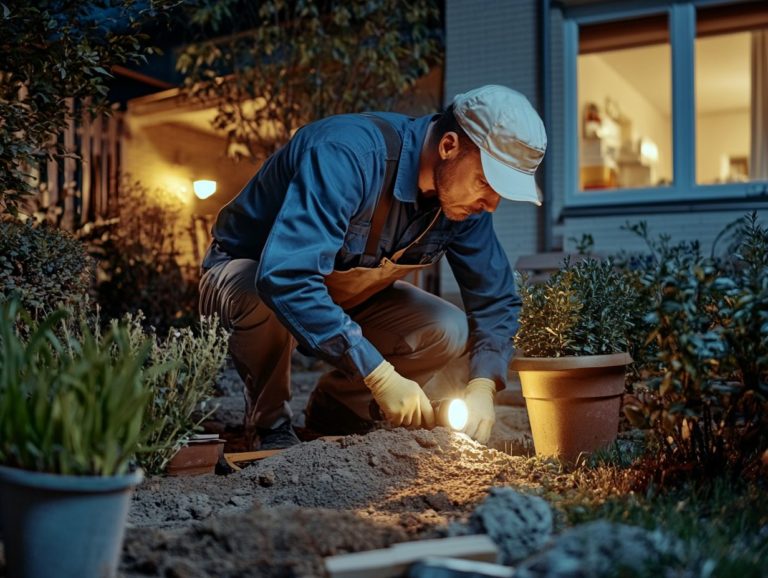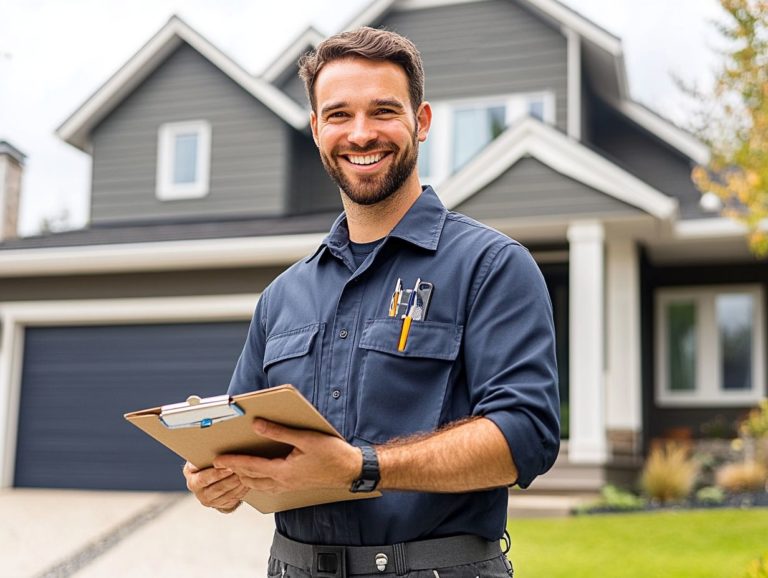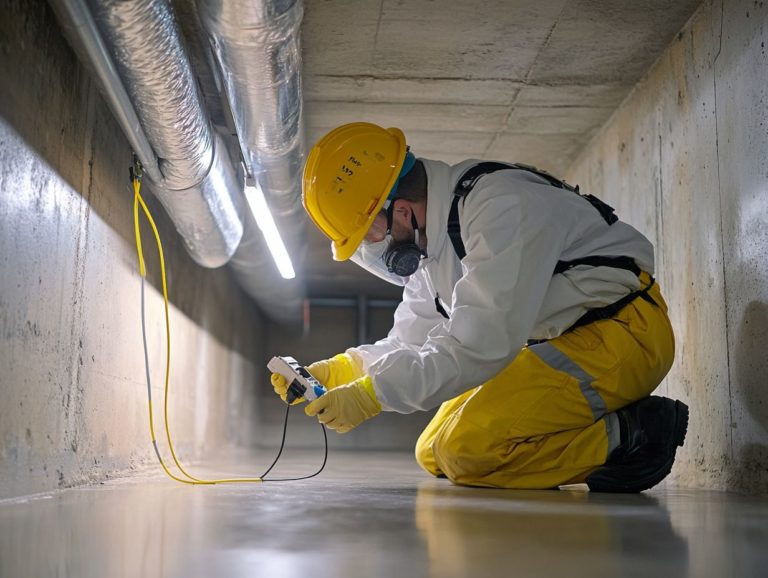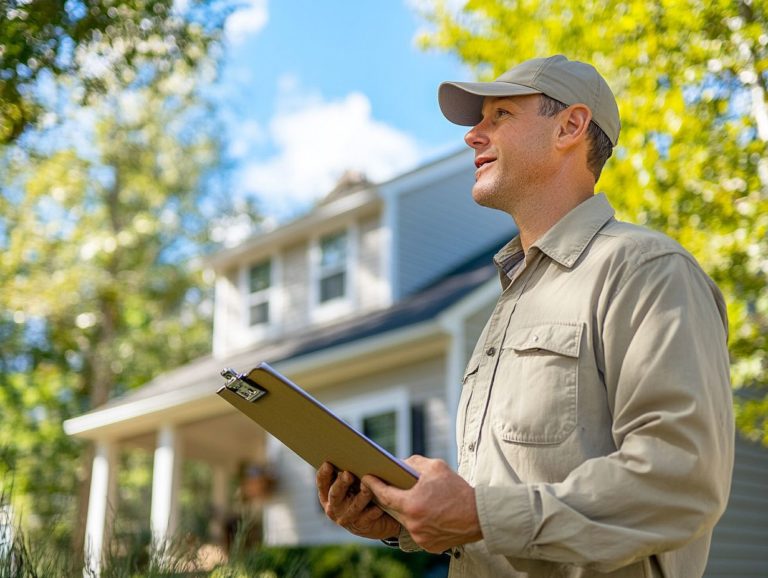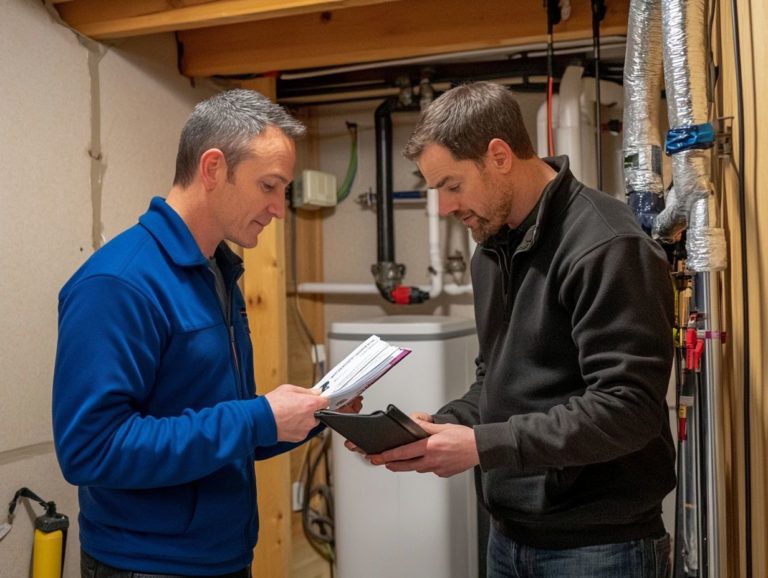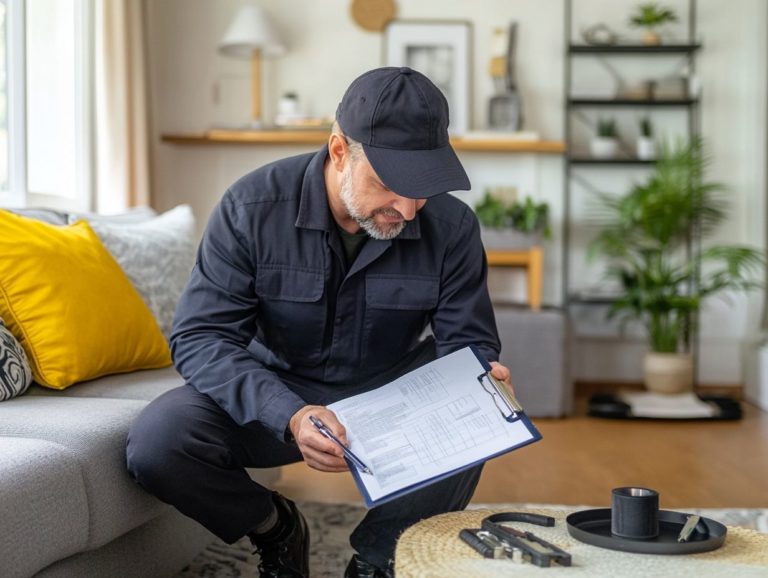How to Prepare Your Home for an Inspection
Buying or selling a home is a significant milestone. Ensuring your property is in peak condition is essential for a smooth transaction.
Home inspections are important in this process. They uncover hidden issues that could impact the sale or negotiations.
This article will show you the importance of home inspections, outline preparation steps, and provide essential checklists for both the exterior and interior of your home.
You ll also discover how to tackle problems that arise and gain tips for enhancing your home s appeal.
Continue reading to arm yourself with everything you need for a successful inspection.
Contents
- Key Takeaways:
- Understanding the Importance of Home Inspections
- Preparing for the Inspection
- Exterior Inspection Checklist
- Interior Inspection Checklist
- Addressing Potential Issues
- Tips for a Successful Inspection
- Frequently Asked Questions
- What is the purpose of preparing my home for an inspection?
- How far in advance should I start preparing my home for an inspection?
- What are some key areas of the home that should be inspected?
- How can I make sure my home is in good condition for the inspection?
- Are there any documents or records I should have ready for the inspection?
- What should I do during the inspection?
Key Takeaways:

Home inspections help you find potential problems before they escalate. They ensure the safety and value of your property.
Before the inspection, prepare for your home inspection by decluttering and cleaning your home to make it easier for the inspector and showcase its best features.
Pay attention to key areas such as the roof, foundation, and electrical and plumbing systems during both the exterior and interior inspections.
Understanding the Importance of Home Inspections
Home inspections play a crucial role in the home selling process. They provide a detailed check of the property that can greatly impact buyer concerns and negotiations.
By enlisting a professional inspector, you can proactively identify and resolve potential issues detailed in the inspection report. For more insights, check out how to prepare for a home inspection as a buyer. This ensures your home aligns with buyer expectations and meets necessary disclosure requirements.
Using this proactive strategy enhances your home’s appeal. It fosters transparency and trust between you and potential buyers, paving the way for smoother transactions and potentially higher property values in the competitive real estate landscape.
Why Home Inspections are Necessary
Home inspections are essential for ensuring the safety and integrity of your property. They address any concerns a potential buyer might have that could impact its overall value.
These detailed evaluations uncover major repairs that could lead to significant costs in the future. They also highlight critical safety features designed to protect occupants from potential hazards.
Inspections illuminate maintenance needs, allowing you to plan and manage future upkeep with ease.
For sellers, this proactive step can significantly reduce the risk of future liabilities by revealing hidden issues before they become problematic.
Securing a home inspection offers reassurance for everyone involved. It paves the way for a smoother transaction and fosters a more informed investment.
Preparing for the Inspection
Preparing for a home inspection is crucial. It ensures everything proceeds smoothly and effectively, allowing the professional inspector to conduct a thorough evaluation of your home’s condition. To learn more about this process, check out how to prepare for a home inspection as a seller.
As a seller, focus on cleaning and decluttering spaces to enhance the home s appearance. Addressing minor repairs can also make a significant difference.
By ensuring all access points for the inspection are clear, you can greatly improve the efficiency of the process. This ultimately paves the way for a more favorable inspection report.
Steps to Take Before the Inspector Arrives
Before the inspector arrives, take several key steps to optimize the inspection process by learning how to prepare for a home inspection and ensure a thorough evaluation of your property’s condition.
Start by organizing your maintenance records. Presenting a clear history of repairs and upgrades can make a significant difference.
Ensure that inspection access points like the attic, crawl spaces, and utility areas are free from clutter. This allows for a comprehensive assessment.
Completing a detailed home maintenance checklist covering critical systems such as heating, ventilation, and air conditioning (HVAC), plumbing, and roofing will aid the inspector in gathering relevant information. This makes the evaluation process smoother.
This proactive approach enhances the experience and enables you to make more informed decisions about necessary repairs and future upkeep.
Exterior Inspection Checklist

An exterior inspection checklist is essential for pinpointing various aspects of a property that can significantly impact its overall condition and market value.
You should prioritize a thorough roof inspection to detect any damage. Additionally, examine drainage systems to prevent water buildup. Evaluating the foundation for visible cracks or other concerns is equally important.
Don t overlook the gutters or essential safety features like smoke detectors. Be vigilant for any signs of pest infestations. This comprehensive approach will ensure you clearly understand the home s exterior condition.
Key Areas to Focus On
When you conduct an exterior inspection, focus on several key areas to ensure the safety and soundness of your home.
First and foremost, pay close attention to the roof. It’s your home’s first line of defense against the elements, and inspecting it for wear and tear can uncover underlying issues that could lead to costly repairs down the line.
Next, evaluate the foundation for overall strength. Even minor cracks can escalate into significant problems, jeopardizing the stability of your property.
Don t forget about the gutters; ensuring they function properly is incredibly important! Clogged or damaged gutters can lead to water damage and erosion over time, creating headaches you definitely want to avoid.
Lastly, check vital safety features like carbon monoxide and smoke detectors. These devices are absolutely vital for keeping your loved ones safe!
Interior Inspection Checklist
An interior inspection checklist is essential for systematically evaluating the various components of your home, ensuring they align with safety standards and functional requirements.
Focus on key areas, such as inspecting appliances to confirm their proper operation. Examine plumbing and sewage systems for any leaks or blockages. Additionally, review electrical work to guarantee that everything is safe and up to code.
Assess the efficiency of your heating, ventilation, and air conditioning (HVAC) systems. Implementing mold prevention measures will enhance your comprehensive evaluation of your home’s interior condition while keeping essential safety features in mind.
Rooms and Features to Pay Attention To
Certain rooms and features within your home demand particular attention during an interior inspection to ensure both safety and functionality.
The kitchen is very important; inspecting appliances like refrigerators, ovens, and dishwashers is crucial for both efficiency and safety. Plumbing issues can lead to unwelcome leaks, and it’s imperative that all electrical work adheres to code to prevent any potential hazards.
Similarly, the bathroom warrants careful examination. Faulty plumbing can encourage mold growth, posing significant health risks to you and your loved ones. Ensure proper ventilation and promptly address any water damage to maintain a healthy living environment.
Functional safety features, such as smoke detectors and fire extinguishers, greatly enhance your home s overall safety.
Addressing Potential Issues
Addressing potential issues uncovered during a home inspection is vital for preserving property value and safeguarding the well-being of its residents.
Whether it s tackling foundation repairs due to structural concerns or managing significant repairs involving HVAC, plumbing, or electrical systems, taking these findings seriously is essential.
Implement pest control measures for any infestations and ensure that safety features are current. By doing so, you not only enhance the home s appeal but also protect the interests of both sellers and buyers potentially bolstered by a home warranty.
Now that you understand the importance of a thorough inspection, take immediate steps to ensure your home is in top condition!
How to Handle Problems Found During Inspection

When you uncover issues during a home inspection, it’s important to tackle these concerns methodically. This helps preserve the home s integrity and safety. Take a smart approach to negotiate necessary repairs with potential buyers. Ensure that everyone walks away feeling satisfied with the results.
Start by prioritizing major repairs that could impact safety or functionality. These are vital for establishing trust and transparency. Don’t overlook pest control options; addressing pest-related problems upfront can greatly influence the negotiation process and alleviate future concerns.
Focusing on these key areas fosters a positive dialogue with buyers. This enhances their overall experience while safeguarding your investment.
Tips for a Successful Inspection
Implementing effective strategies for a successful inspection can elevate your chances of achieving a favorable outcome in the home selling process, such as learning how to prepare for a home inspection.
Key tactics include:
- Enhancing your home s appearance through meticulous cleaning and decluttering,
- Promptly addressing minor repairs,
- Maintaining detailed home maintenance records to instill confidence in potential buyers about the property’s condition.
By preparing diligently and understanding buyer negotiations, you can shape the inspection experience and its impact on the transaction. Consider following tips for a successful home inspection day to ensure everything goes smoothly.
Maximizing Your Home’s Appeal and Value
Maximizing your home s appeal and value is crucial for attracting buyers and ensuring a successful sale in today s competitive real estate market. Begin with enhancing your curb appeal.
Simple touches like landscaping, fresh paint, or new fixtures can create a striking first impression. Don’t overlook minor repairs. Fixing leaky faucets or replacing broken tiles can significantly elevate both the aesthetic and functionality of your property.
Maintaining a consistent home maintenance routine is vital as well. Ensuring that all systems are in good working order can prevent minor issues from escalating into costly repairs. By staying on top of regular upkeep, you create an inviting space that makes potential buyers feel right at home.
Frequently Asked Questions
What is the purpose of preparing my home for an inspection?
The purpose of preparing your home for an inspection is to ensure that your home is in good condition and complies with safety and building standards. Learning how to prepare for a successful home inspection helps identify any potential issues that need to be addressed beforehand and increases the chances of a successful inspection.
How far in advance should I start preparing my home for an inspection?
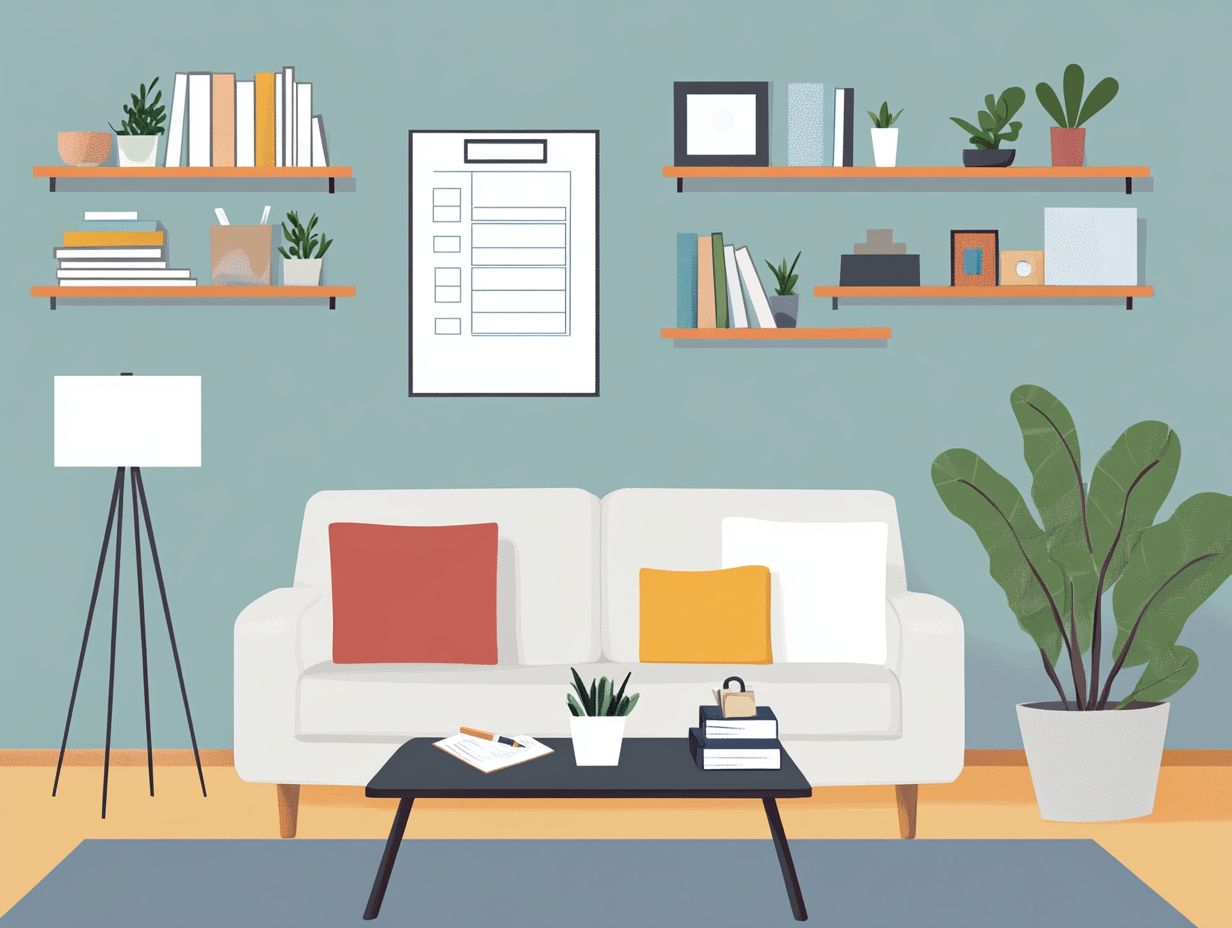
Start preparing your home for an inspection at least 1-2 weeks before the scheduled date. This allows enough time to identify and address any potential issues, following key steps for preparation.
What are some key areas of the home that should be inspected?
Key areas of inspection include:
- Exterior
- Interior
- Plumbing
- Electrical
- HVAC systems
These areas should be thoroughly checked for potential safety hazards or maintenance issues.
How can I make sure my home is in good condition for the inspection?
To ensure your home is in good condition for the inspection, start with decluttering and deep cleaning. This makes it easier for the inspector to assess your home and creates a good impression. Additionally, preparing your home for an inspection includes addressing any necessary repairs or maintenance tasks.
Are there any documents or records I should have ready for the inspection?
Yes, it’s important to have relevant documents or records ready. This includes permits, warranties, and maintenance records for appliances and systems in your home. Having these documents available can help the inspection process go smoothly.
Get started today to ensure your home shines during inspection!
What should I do during the inspection?
During the inspection, give the inspector space to do their job. You can follow along and ask questions if you have any.
Take notes on any issues the inspector mentions. This will help you prioritize repairs and maintenance.
Don t miss the chance to clarify any doubts during the inspection. Taking notes will empower you to tackle repairs swiftly!

